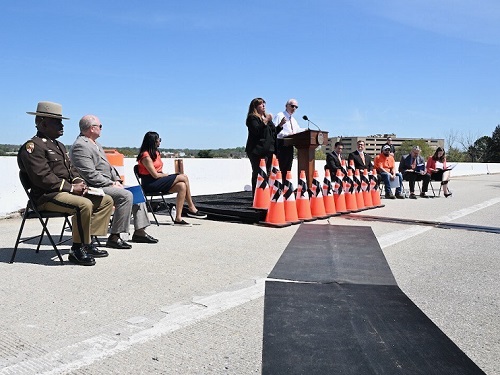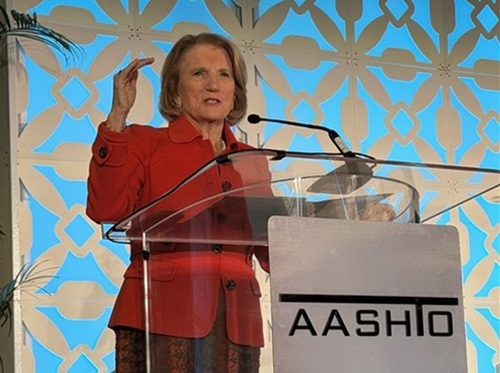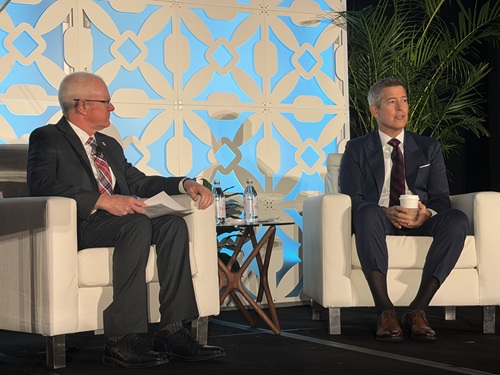The California-based Mineta Transportation Institute (MTI) recently issued a report calling for “greater attention” to be paid to the need for “mindfulness, psychological safety, and emotional well-being” for transportation industry workers.
[Above image by MTI]
That new report – entitled Reinforcing the Human Infrastructure of our Nation’s Transportation System – builds off a panel discussion among safety experts held during the 2023 American Psychological Association’s “Work, Stress, and Health” conference held in Miami last November.

“Even in the short term, toxic work environments and negative emotional contagion can be devastating to mental health, physical health, job performance, and safety,” Dr. Karen Philbrick, MTI’s executive director, during that conference.
“Over the long term, they can create a culture of such pervasive toxicity that it may affect public safety and the economic viability of our transportation systems,” she stressed.
That panel discussion also referenced a “new framework” issued by the U.S. Surgeon General in 2022 for mental health and well-being in the workplace; a framework that claimed 76 percent of all U.S workers reported at least one symptom of a mental health condition, with 84 percent noting that their workplace conditions had contributed to at least one mental health challenge.
[Editor’s note: The American Association of State Highway and Transportation Officials will be holding a knowledge session at its 2024 Annual Meeting in Philadelphia October 29 through November 1 entitled “Beyond Blueprints: Addressing Mental Health and Substance Misuse in Construction Workforce Safety.”]
MTI’s report offered several suggestions for helping support and improve the mental health of transportation workers, including:
- Development of peer-to-peer influencing skills that improve social intelligence and conflict management.
- Leadership emotional intelligence training that fosters psychologically safe work environments that ensure employees feel comfortable speaking up.
- Integration of mindfulness practices into day-to-day work practices that supports employee’s awareness, empathy, openness, humility, and resilience to stress.
- Psychologically safe onboarding processes that welcome newcomers into an environment that supports speaking up and interpersonal risk-taking.
- Team building that helps foster agile self-improvement-oriented teams for improved organizational functioning, especially in high-hazard environments.
- Continuous learning and development that weaves psychological safety and emotional intelligence into the fabric of the organization across time.
State departments of transportation are already engaging in efforts to address many of those “human infrastructure” needs within their workforces.

For example, in January at the 2024 Transportation Research Board Annual Meeting in Washington, D.C., Diane Gutierrez-Scaccetti – former commissioner of the New Jersey Department of Transportation – moderated a panel discussion regarding ways to address the mental health needs of transportation workers.
“We cannot break the stigma about mental wellness and the high rate of suicide among construction workers unless we discuss it,” noted Gutierrez-Scaccetti, describing it as “one of our biggest issues” as the transportation sector recovered from the impact of the COVID-19 pandemic.
State DOTs are also focused on ways to improve the physical safety parameters around their workforces – efforts that also reduce stress and worry, which can help minimize the mental health impact of highway work zones.
For instance, the Maine Department of Transportation deployed a new “Smart Work Zone System” in May that involved deploying portable sensors miles ahead of interstate work zones.
Those sensors monitor vehicle speeds and volumes, allowing the Maine DOT to collect real-time traffic information and put that information on digital message boards – providing motorists with real-time updates on roadway work zones ahead of them.

[Editor’s note: In April, state departments of transportation across the country addressed the issue of work zone safety in a variety of ways as part of the 2024 National Work Zone Awareness Week safety campaign.]
“Early warnings about speed reductions or stopped traffic are especially important when vehicles are traveling at interstate speeds,” said Shawn Smith, senior project manager at MaineDOT, in a statement.
“Smart Work Zone System technology is allowing MaineDOT to do daytime construction work this year on I-295 between Topsham and Gardiner,” he noted. “This daytime construction improves safety while also reducing costs to Maine taxpayers.”
Health and wellness were also critical points mentioned in a knowledge session held at the American Association of State Highway and Transportation Officials 2023 Annual Meeting regarding current and future workforce recruitment and retention issues.
Jeff Pelton, assistant secretary-finance and administrative services for the Washington State Department of Transportation stressed that making younger workers feel like they “belong” to a company, be it in the private or public sector, is crucial.
“When employees feel like they belong in a workplace, it can increase retention rates,” he said during the session.
“We really need to be focused on the cultural aspects of attracting and keeping them in our workforce. That means concentrating on employee engagement; the modern work environment, where year-to-date an average of 43 percent of the WSDOT workforce teleworked; and developing talent,” Pelton noted. “We really have to sell our culture and our flexibility as a state DOT.”
Brian Turmail, vice president of public affairs and strategic initiatives for the Associated General Contractors of America, echoed the “cultural themes” espoused by WSDOT’s Pelton, noting that his organization has created a “culture of care” curriculum to help contractors make construction job sites more welcoming and supportive.
“We must create a more welcoming place at the construction job site for every generation wants to feel more part of the team,” he said.
 Top Stories
Top Stories
Congressional Leaders Detail Key Transportation Priorities
February 27, 2026 Top Stories
Top Stories

